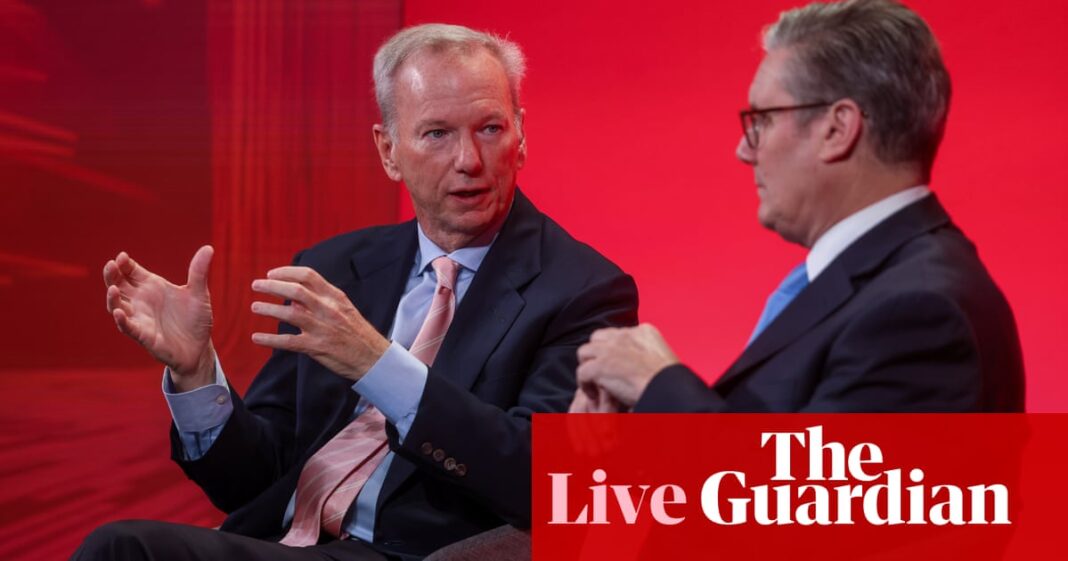UK urged to expand ‘high-skilled’ immigration to help with AI
Q: How can British companies attract the talent it needs for the artificial intelligence revolution?
Former Google CEO Eric Schmidt says:
A pro-growth agenda would start with high-skilled immigration, which is now in place here and should be expanded.
Schmidt points out that a lot of “incredibly smart people” are now getting graduate degrees in AI.
The key, he says, is either to keep them in Britain or get them to move here from Europe.
Schmidt agrees that more AI talent is needed, as the technology is hard, complicated, and it’s being built right now.
He admits:
Sometimes it doesn’t make sense to me, and I have a PhD in the area.
But with a little bit of time, and the right leadership., Britian can have all those people.
Schmidt points out:
They love living here.
A good moment to wrap up the session.
Key events
Photos: Summit attendees
US tech firms to invest £6.3bn in UK data centres
A group of US tech firms have announced they will invest over £6bn in UK data centres.
ServiceNow, CyrusOne, CloudHQ and CoreWeave would invest a combined £6.3bn in UK data centre technology, the government says at today’s investment summit.
Technology Secretary Peter Kyle calls the move a ‘vote of confidence’ in Britain, which will take the total investment in UK data centres to over £25bn since the government took office in July.
CloudHQ is set to develop a new £1.9bn data centre campus in Didcot, Oxfordshire.
Kyle says:
Tech leaders from all over the world are seeing Britain as the best place to invest with a thriving and stable market for data centres and AI development.
Data centres power our day-to-day lives and boost innovation in growing sectors like AI. This is why only last month, I took steps to class UK data centres as Critical National Infrastructure giving the industry the ultimate reassurance the UK will always be a safe home for their investment.
Today’s drumbeat of investment is a vote of confidence in Britain and our approach to work with business to deliver sustained growth for all.
UK announces £27m tie-up with Eli Lilly
The government has also announced a “landmark collaboration” with pharmaceuticals giant Eli Lilly, worth £279m, to accelerate the delivery of next-generation medicines.
Eli Lilly has expressed an intention to invest in the UK, as part of a collaborative partnership with the government announced at the International Investment Summit today.
Eli Lilly plans to launch the first ‘Lilly Gateway Labs’ innovation accelerator in Europe. It will support early-stage life sciences businesses, by providing them with lab space, mentorship, and potential financial backing.
Health and Social Care Secretary, Wes Streeting, says:
“For all the challenges facing the health of our nation, we have two huge advantages: some of the world’s leading scientific minds, and a National Health Service with enormous potential. If we can combine the two, patients in this country can reap the rewards of the revolution in medical science unfolding before our eyes.
“This announcement helps the UK take its place as a world leader in life sciences and brings life-changing treatments closer to being a reality for NHS patients. Partnerships like this are key to building a healthier society, healthier economy, and making the NHS fit for the future.”
The collaboration intends to explore new ways of delivering health and care services to people living with obesity, the government adds.
Eli Lilly makes an anti-obesity drug called Zepbound in the US, or Mounjaro in the UK. Last week, the NHS said it would offer Mounjaro to nearly a quarter million people as part of a three-year plan.
£1.1bn investment to expand Stansted

Gwyn Topham
A five-year, £1.1bn investment to grow London Stansted has been unveiled by the Prime Minister at the International Investment Summit.
Just over half the money, some £600m, will go on previously announced plans to expand the airport’s terminal by a third, as it grows its capacity from 29m passengers to 43m per year.
Another £500m will be spent on other enhancements to the existing terminal and to the wider airport, notably a 14.3MW on-site solar farm to support Stansted’s increasing electricity demands, including its new EV charging forecourt.
Construction is expected to begin next year and take two to three years to complete.
Planning permission for expansion was granted last year, but the cost of the overhaul has not previously been released – and with owning group MAG being one-third owned by overseas investors IFM (if mainly by Manchester councils) the announcement brings an element of foreign money to the UK.
Transport secretary Louise Haigh said:
“Transport is central to this government’s core mission of growing the economy. This is about giving companies like MAG the confidence to invest, boosting regional and national economic growth, and supporting the aviation sector while also meeting our existing environmental obligations.”
Ken O’Toole, CEO of MAG – which owns Manchester and East Midlands Airports as well as Stansted, said:
“Aviation is an essential enabler of the success of the UK’s key high-value industries, and we look forward to helping the government achieve the highest sustained growth in the G7 through the sustainable growth of our airports.”
NEW: PM at investment summit announces a £1bn deal with Manchester Airport Group to expand Stansted. PM says it open up new routes for work and holiday destinations
Starmer says deal the “first of tens of billions worth of inward investment deals that we will sign today,…
— Beth Rigby (@BethRigby) October 14, 2024
Trio of professors win Nobel economics prize for work on post-colonial wealth

Kalyeena Makortoff
Speaking of Nobel prizes… two UK-born academics are among a trio of US-based professors who have just won this year’s Nobel prize in economics, for showing how the types of institutions introduced by colonisers have helped determine whether a country is rich or poor today.
The explanation put forward by Turkish-American Daron Acemoğlu, Sheffield-born Simon Johnson and Briton James A Robinson, suggests that inclusive institutions for the long-term benefit of European migrants ended up resulting in more prosperous societies in the long term.
However, they found that in countries where the aim was to exploit the Indigenous population and extract resources for the colonisers’ benefit, the impact has been detrimental, and resulted in far poorer societies, leaving some countries trapped in low economic growth cycles.
UK urged to expand ‘high-skilled’ immigration to help with AI
Q: How can British companies attract the talent it needs for the artificial intelligence revolution?
Former Google CEO Eric Schmidt says:
A pro-growth agenda would start with high-skilled immigration, which is now in place here and should be expanded.
Schmidt points out that a lot of “incredibly smart people” are now getting graduate degrees in AI.
The key, he says, is either to keep them in Britain or get them to move here from Europe.
Schmidt agrees that more AI talent is needed, as the technology is hard, complicated, and it’s being built right now.
He admits:
Sometimes it doesn’t make sense to me, and I have a PhD in the area.
But with a little bit of time, and the right leadership., Britian can have all those people.
Schmidt points out:
They love living here.
A good moment to wrap up the session.
Q: How can the UK win the battle for AI talent?
Keir Starmer argues that Britain is in a good position now, in the top three in the world for artificial intelligence thanks to world-leading universities.
He agrees that the UK needs to attract top talent. Making it clear that AI matters to the UK should help the country hold its leading position, he says.
Starmer urged to take action on data centres
Former chief Eric Schmidt then fires a warning to Keir Starmer that Britain risks missing out on the move to data centres, which are notoriously energy-thirsty.
Schmidt tells Starmer, on the stage at the investment summit:
The demand for energy for data centres is massive.
We need you to approve the necessary steps to make these data centres in Britain, because your research scientists, your companies, your citizens all need these things.
Schmidt argues that investing heavily in AI will pay off, by finding ways to improve energy efficiency – finding the solutions to the energy transition faster.
GSK chief Emma Walmsley turns to the health service…
Keir Starmer says the UK is “rightly proud” of the NHS, set up by Labour over 70 years ago.
The simple truth is that simply putting more money into the health services as it is won’t make it fit for the future.
The PM insists he’s not talking about changing the principle of healthcare being free at the point of use.
Instead, he says there is huge potential for AI to improve the delivery of public services, such as health care. He cites technology using AI to scan for liver cancer – which he’s seen, and which massively improves the chance of spotting the disease early.
Eric Schmidt backs up this point, saying computer vision is now more accurate than human vision, so can do a better job of spotting early signs of illness.
Eric Schmidt: UK’s smart, stable civil servive is an AI asset
Former Google chief Eric Schmidt tells the summit that the Science Museum down the road shows how the industrial age was invented here in the UK.
There’s every reason to think that artificial intelligence will have the same level of impact. And by the way, it was invented right here too, in particular in Kings Cross, which I think is..
“My constituency”, says Keir Starmer proudly, pointing out that Demis Hassabis winning the Nobel prize last week was “absolutely amazing”.
I said to him yesterday, I feel proud, he should.
Schmidt then eulogises about AI, arguing that AI will make everyone at least twice as productive.
That means Starmer can make twice as many speeches…
…The PM suggests this might not be popular, winning some laughs in the room…
while a firm such as GSK can make incredible life-saving drugs twice as quickly.
The key to AI is efficiency gains, Schmidt adds, which will lead to a massive wave of investment and higher incomes for people.
Schmidt points out that last year the UK laid out the core structure of AI safety (under Starmer’s predecessor, Rishi Sunak).
He says Britain is in a good position to take the lead on AI, as:
The UK has frankly stronger civil servants, who are smarter and more committed to this, and are frankly stable, so you can work with them.
There’s every reason the UK can build the AI world, and also help deal with the ‘guardrail’ issue, Schmidt adds.


